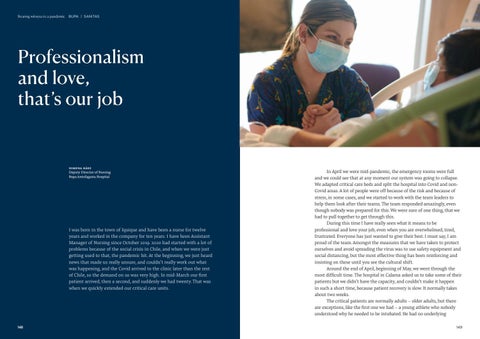Bearing witness to a pandemic BUPA | SANITAS
Professionalism and love, that’s our job
ximena báez Deputy Director of Nursing Bupa Antofagasta Hospital
I was born in the town of Iquique and have been a nurse for twelve years and worked in the company for ten years. I have been Assistant Manager of Nursing since October 2019. 2020 had started with a lot of problems because of the social crisis in Chile, and when we were just getting used to that, the pandemic hit. At the beginning, we just heard news that made us really unsure, and couldn’t really work out what was happening, and the Covid arrived to the clinic later than the rest of Chile, so the demand on us was very high. In mid-March our first patient arrived, then a second, and suddenly we had twenty. That was when we quickly extended our critical care units.
148
In April we were mid-pandemic, the emergency rooms were full and we could see that at any moment our system was going to collapse. We adapted critical care beds and split the hospital into Covid and nonCovid areas. A lot of people were off because of the risk and because of stress, in some cases, and we started to work with the team leaders to help them look after their teams. The team responded amazingly, even though nobody was prepared for this. We were sure of one thing, that we had to pull together to get through this. During this time I have really seen what it means to be professional and love your job, even when you are overwhelmed, tired, frustrated. Everyone has just wanted to give their best. I must say, I am proud of the team. Amongst the measures that we have taken to protect ourselves and avoid spreading the virus was to use safety equipment and social distancing, but the most effective thing has been reinforcing and insisting on these until you see the cultural shift. Around the end of April, beginning of May, we went through the most difficult time. The hospital in Calama asked us to take some of their patients but we didn’t have the capacity, and couldn’t make it happen in such a short time, because patient recovery is slow. It normally takes about two weeks. The critical patients are normally adults - older adults, but there are exceptions, like the first one we had - a young athlete who nobody understood why he needed to be intubated. He had no underlying 149































